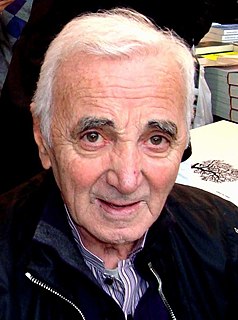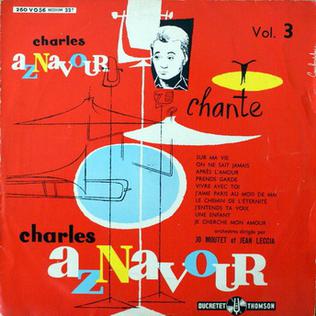Related Research Articles

Édith Piaf was a French singer-songwriter, cabaret performer and film actress noted as France's national chanteuse and one of the country's most widely known international stars.

Charles Aznavour was a French-Armenian singer, lyricist, actor and diplomat. Aznavour was known for his distinctive tenor voice: clear and ringing in its upper reaches, with gravelly and profound low notes. In a career as a composer, singer and songwriter, spanning over 70 years, he recorded more than 1,200 songs interpreted in 9 languages. Moreover, he wrote or co-wrote more than 1,000 songs for himself and others.

"She" is a song written by Charles Aznavour and Herbert Kretzmer and released by Aznavour as a single in 1974. The song was written in English as a theme tune for the British TV series Seven Faces of Woman.

Olympia 81 is a French-language album released in 1981 by French singer Dalida. The album was highly successful and received a gold certification.

Pierre Delanoë, born Pierre Charles Marcel Napoléon Leroyer in Paris, France, was a French lyricist who wrote thousands of songs for dozens of singers, including Dalida, Edith Piaf, Charles Aznavour, Petula Clark, Johnny Hallyday, Joe Dassin, Michel Sardou and Mireille Mathieu. Delanoë was his grandmother's maiden name.
"Que C'est Triste Venise" is a song written by Armenian-French artist Charles Aznavour and Françoise Dorin and sung by Aznavour about Venice. It was first recorded in French by Aznavour in 1964, and later in Spanish, German, English, and most notably in 1971 in Italian.

La Bohème is a song written by French songwriter Jacques Plante and Armenian-French artist Charles Aznavour. It is Aznavour's signature song, as well as one of the most popular French-language songs and a staple of French chanson.
"Hier encore", whose original French title translates as something like "Just yesterday" or "Not so long ago", is a song written by Charles Aznavour and released in September 1964.
"Une vie d'amour" is a song written by Charles Aznavour to the music of Georges Garvarentz. The Russian lyrics of the song were written by Natalia Konchalovsky.

"Pour toi Arménie" is a 1989 song written and composed by Charles Aznavour, and recorded by a group of French singers who were popular at the time. This charity single was intended to raise funds to help the Armenians who experienced the 1988 Spitak earthquake. It sold more than 1 million copies under the Trema-EMI label.

The Aznavour Centre is Aznavour Foundation's first cultural project. The French President Emmanuel Macron and the Armenian President Armen Sarkissian were present at the Aznavour Centre project presentation.
Charles Aznavour, released in January 1961, is the seventh French studio album by the French-Armenian singer Charles Aznavour. This album is also known under the title "Je m'voyais déjà". The album includes songs by Charles Aznavour, Georges Garvarentz, and others. According to The book of golden discs, 'Je m'voyais deja' was one of the hits which from 1961 helped Aznavour to become "an international favourite". The album became a bestseller in Belgium and a hit in France.

Aznavour toujours is the 50th French studio album by the French-Armenian singer Charles Aznavour, released in 2011. Toujours became his seventh album in the 21st century. According to Allmusic, "this collection of 12 self-penned tracks shows that the 87-year-old is still capable of cutting it alone". Album cover photograph is taken by Karl Lagerfeld.

La mamma is the eleventh French studio album by the French singer Charles Aznavour, released in 1963. It achieved TOP1 in France for several weeks, Spain, it was a TOP10 hit in Belgium, Holland, and other countries. It became a bestseller, and sold over a million copies only in France. The English version of 'La Mama' entitled 'For Mama', was written in 1964, with words by Don Black and became a hit in Philippines. In the US Ray Charles performed it.

Qui ? (Who?) is the tenth French studio album by the French-Armenian singer Charles Aznavour, released in 1963.

Autobiographie is the 30th French studio album by the French-Armenian singer Charles Aznavour, released in 1980.

Chante Charles Aznavour, vol. 3 is a 1955 album by Charles Aznavour. It was the third of three similarly titled 10" vinyl LPs for Ducretet-Thomson at the very beginning of the Charles Aznavour discography.

Let Me Entertain You is a studio album by French singer Amanda Lear, released in May 2016 by the independent label Boomlover.
This is a filmography for French singer Charles Aznavour. In a career spanning over 70 years, he appeared in more than 60 feature films and was the subject of at least three documentary films.
Valentina Tronel, better known as simply Valentina, is a French singer who, in 2016, took part in the French version of The Voice Kids. Since 2018, she has been part of the child musical group Kids United Nouvelle Génération, with whom she has recorded the albums Au bout de nos rêves (2018) and L'Hymne de la vie (2019). In 2020, she represented France with the winning song "J'imagine" at the Junior Eurovision Song Contest.
References
- ↑ "Song artist 917 - Charles Aznavour". Tsort.info. Retrieved 29 April 2021.
- ↑ Memories of my life - By Charles Aznavour - Page 161
- ↑ "Cover versions of Sur ma vie by Charles Aznavour". Secondhandsongs.com. Retrieved 29 April 2021.